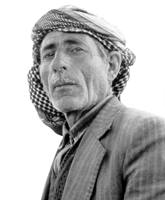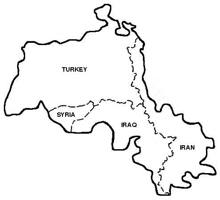
|
The Society of Folk Dance Historians (SFDH) Kurds
[
Home |
About |
Encyclopedia | CLICK AN IMAGE TO ENLARGE |

|
 During the centuries of domination by the Turks in Eastern Anatolia, there lived with the Armenians other ethnic minorities among whom were Arabs, Assyrians, Greeks, Kurds, etc. Much was shared by these small groups, and each borrowed from the other among the many social items: language vocabulary, folklore, music, dance, etc. One of these minorities, the nomadic Kurds, lived or wandered in the northern Middle East.
During the centuries of domination by the Turks in Eastern Anatolia, there lived with the Armenians other ethnic minorities among whom were Arabs, Assyrians, Greeks, Kurds, etc. Much was shared by these small groups, and each borrowed from the other among the many social items: language vocabulary, folklore, music, dance, etc. One of these minorities, the nomadic Kurds, lived or wandered in the northern Middle East.
The Kurds (Kurdish People) are an Iranian ethnic group of the Middle East mostly inhabiting a contiguous area spanning adjacent parts of northwestern Iran, northern Iraq, northern Syria, and southeastern Turkey. The Kurds are culturally, historically, and linguistically classified as belonging to the Iranian peoples. Kurds are often regarded as "the largest ethnic group without a state."
Kurdish nationalism emerged after World War I with the dissolution of the Ottoman Empire which had historically successfully integrated (but not assimilated) the Kurds, through use of forced repression of Kurdish movements to gain independence.
The Kurdish region of Iran has been a part of the country since ancient times. Kurdish culture is a legacy from the various ancient peoples who shaped modern Kurds and their society. As most other Middle Eastern populations, a high degree of mutual influences between the Kurds and their neighboring peoples are apparent. Therefore, in Kurdish culture elements of various other cultures are to be seen. However, on the whole, Kurdish culture is closest to that of other Iranian peoples.
In 1964, the Kurds were granted independence by Iraq, but their striving for added freedom continues.
They are mostly of the Islamic faith and close to the Iranian in race and language. One of the several dances of Kurdish origin done by Armenians throughout the world is the "Halay."
Most popular dance: Delilo.
Language: Kurdish.
Religions: Islam, Alevism, Ahl-i Haqq, Yazidism, Zoroastrianism, and Christianity
DOCUMENTS
- Iran, a country.
- Middle East, a region.
- Turkey, a country.
This page © 2018 by Ron Houston.
Please do not copy any part of this page without including this copyright notice.
Please do not copy small portions out of context.
Please do not copy large portions without permission from Ron Houston.